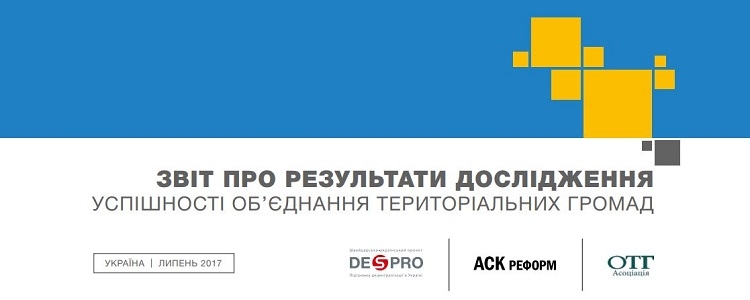The overwhelming majority of the heads of ATCs positively assess the Decentralization Reform

The overwhelming majority of the heads of ATCs positively assess the decentralization reform. This data was obtained as a result of a sociological survey conducted by the Expert Center “ASK Reform” supported by the Swiss-Ukrainian Decentralization Support Project in Ukraine - DESPRO and with the participation of the Association of Amalgamated Territorial Communities.
The research was conducted using a telephone survey. 254 heads of village, settlement and town amalgamated communities from all regions of the country took part in it. As a reminder, today there are 413 amalgamated territorial communities (ATCs) in Ukraine.
High overall assessment of the outcomes of the reform
The overwhelming majority of the heads of the ATCs point out the correctness of the trend of events in their communities (92%) and in the decentralization processes (87%). As a result of the amalgamation, the community has gained “positive” and “rather positive” results, - according to 54% and 32% of respondents, respectively. 9% of heads of ATCs have not noticed any changes since the amalgamation, and only about 4% have rated the results of the amalgamation as negative.
It is interesting to note the difference in perception of the reform among the heads of communities, depending on the year of an ATC amalgamation. Thus, almost all heads of communities formed in 2015 assess the amalgamation results as “positive” and “rather positive” (98% in total). In the communities formed in 2016, the percentage of positive responses falls to 89 points. While in the communities that have been formed this year, only 56% of the respondents (in total) indicate a positive assessment.
“This can be explained by the fact that the newly formed communities have not yet been able to take full advantage of the benefits of amalgamation. At the same time, more "experienced" communities already enjoy the benefits of the amalgamation to the fullest extent”, - Mr. Ihor Abramiuk, Development Director at the Association of Amalgamated Territorial Communities, expressed his opinion.
Increased budgets, unregulated land issues
Among the positive outcomes of the amalgamation, 47% of heads of ATCs, without additional suggestions, mention the growth of financial resources of the community, and 39% - the opportunity to solve local development problems. As negative ones - 15.4% of those surveyed spontaneously mention additional burden on the local budget through the transfer of education and medicine. However, with reference to the suggestion, 95% of heads of ATCs point out the impossibility to dispose of land outside of settlements as a negative outcome.
The inability to dispose of land throughout the territory of the amalgamated community was also mentioned by 95% of the respondents while answering the question about areas in which communities lack authority. So, 28% of those surveyed formulate the following task to the central government for the nearest future: “to transfer land and water resource management to the local level”. This is the second thought in the list of “tasks”. The first one is to complete the decentralization process (50%), and the third one is to provide financial support (13%). Only 2% of the heads of communities are satisfied with the scope of authorities they have.
Major Overhaul of the Country
It is interesting to know answers to the question concerning topical issues which communities have spent increased financial resource on after amalgamation. Thus, 52% of the heads of ATCs got engaged primarily in reconditioning of roads and sidewalks, as well as in the improvement of the operation of schools. Other responses included: kindergartens (32%), housing and communal services (27%), and street lighting (26%).
“The heads of the amalgamated communities began with simpler tasks: lighting, public amenities, and the like. Too little attention has been paid to the development of local economy. This reinforces the Prime Minister’s words that local economic development should be one of the key priorities of further formation of the amalgamated communities”, - commented Ms. Oksana Garnets, DESPRO Project Manager, one of the organizers of the survey.
The Cabinet plays a key role in supporting the Communities
The research has also revealed an interesting pattern regarding the assistance that ATCs get from various institutions: state, local and public (community) ones. Thus, 70% of the respondents mention oblast administrations as the institutions from which they obtain the greatest support. 49% of those surveyed designate the Cabinet of Ministers of Ukraine as such institution, while 34% - oblast councils.
However, if we have a look at the answers to these questions with a breakdown, we can see that the “experienced” heads of ATCs (formed in 2015) most often mention the interaction with the Government (72%), while among the newly formed – only 29%. “That is, with the experience comes the understanding that it is the Cabinet of Ministers that plays the main role in supporting the ATCs, and not the oblast administrations. This is an interesting pattern”, - said Ms. Oksana Ruda, Executive Director of the Expert Center “ASK Reform”, one of the organizers of the survey.
The complete Survey Results Report can be reviewed HERE


